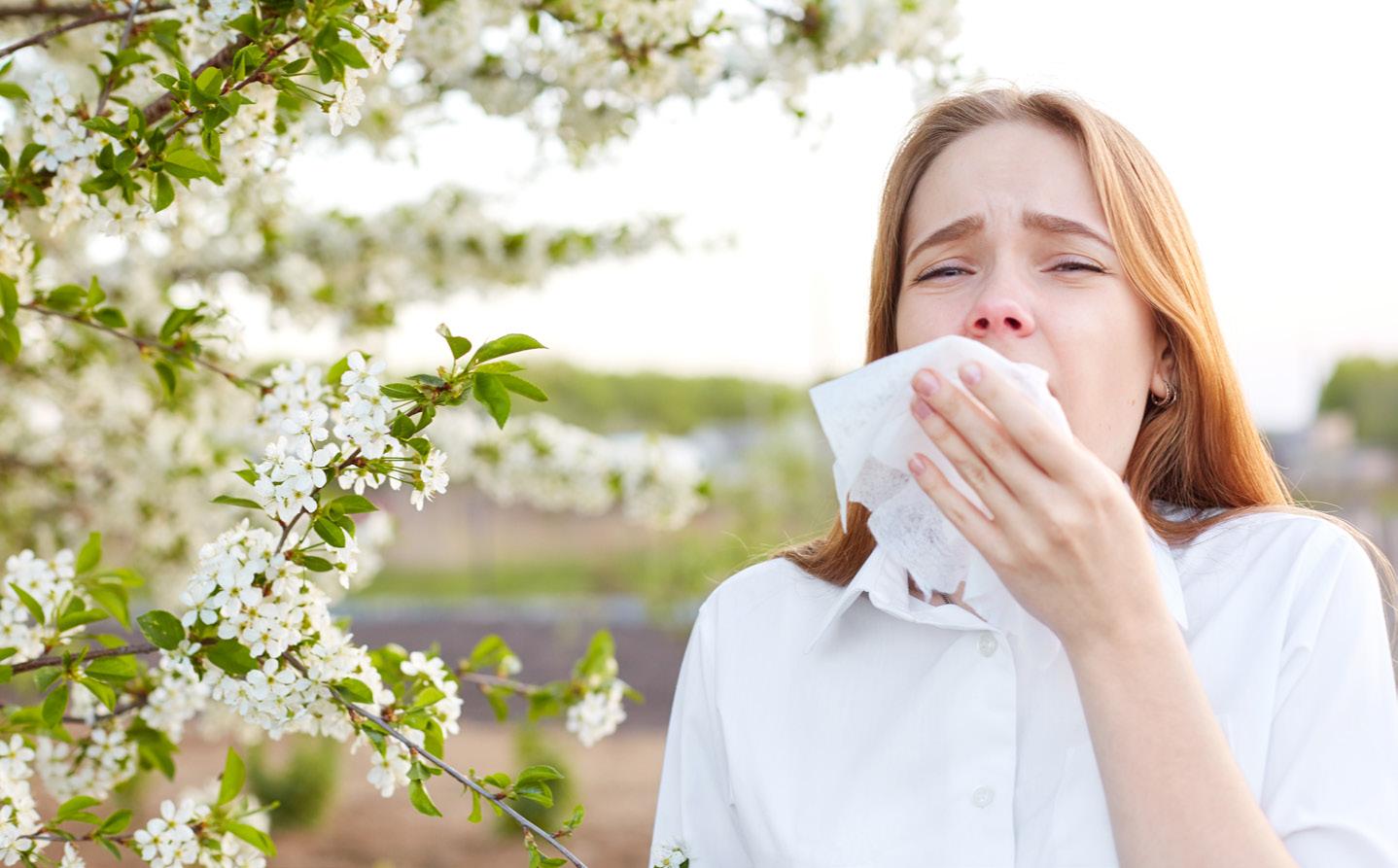
5 minute read
Things You Should Know About Allergies
By Ernst Lamothe Jr.
While nationwide the temperatures are trending upward and we are experiencing brighter forecasts, we are also seeing an increase in spring and summer allergies.
Advertisement
Around 50 million people suffer from allergies in the U.S., according to The American College of Allergy, Asthma and Immunology, which makes it a very common ailment.
“Allergies are common and millions of people suffer from allergies worldwide,” said physician Cheryl Rozario, assistant professor of medicine at the University of Rochester Medical Center. “Hay fever can lead to a variety of symptoms that can decrease quality of life and exacerbate other allergic conditions such as asthma. Some allergies can be severe or life-threatening, such as bee sting allergies, or potentially food and drug allergies.”
Rozario, who holds a master of public health (MPH) and an osteopathic medicine degree (OD), specializes in allergy, immunology and rheumatology. She talks about five aspects of allergy ailments.
1.Spring vs summer allergies
Common symptoms of allergies include sneezing, runny nose or nasal congestion, itchy or watery eyes, post nasal drip, cough or feeling tired.
Recognizing and managing these conditions can improve quality of life and overall health.
“Although allergy symptoms for an individual may be the same in spring and summer, the specific type of environmental allergen can differ,” said Rozario. “For example, tree pollen counts are higher during spring in our area, and grass pollen is higher during summer. In addition, during the warmer months, stinging insects such as bees, wasps and hornets can also cause allergic reactions.”
2.Misconceptions about allergies
Sometimes the symptoms of allergies can mimic those of other conditions, so it is important to be evaluated by your primary care doctor and if needed, consultation with an allergist. Respiratory allergies and colds look and feel a lot alike. Both cause sneezing, a runny or stuffy nose and tiredness. But unlike allergies, colds are caused by a virus, so you can spread them to other people. Allergic rhinitis can be mistaken for a sinus infection, or coughing that is related to underlying asthma might be mistaken for bronchitis. To make sure of the diagnosis and receive the proper treatment, it is important to be evaluated.
“Many people think that allergies are only seasonal, however, indoor allergens such as dust mites and pet dander can also trigger allergy symptoms all year round. In addition, allergies may be not recognized
Drug-Free Tips to Fight Spring Allergies

Spring allergies can be brutal, and many — but by no means all — sufferers reach for synthetic medications to combat their symptoms. Many others want something more natural, however.
“These allergies cause unpleasant symptoms such as runny noses, sneezing, itchy eyes and nasal congestion,” said physician Jo Reed, an expert in allergy, asthma and as a true medical condition but they are, and require management to keep symptoms controlled,” said Rozario.
3.Allergy maintenance
Those spring flowers also bring flowering buds and blooming trees. Because of those environmental conditions, there are various prevention options for allergy sufferers.
“It’s important to minimize exposure to allergic triggers to prevent symptoms. For example, pollen counts are higher during the morning and midday, so planning outdoor activities in the evenings may be better,” said Rozario. “Closing windows may help to keep pollen outside as well. For indoor allergens, keeping pets out of the bedroom at night when you sleep may help minimize exposure to dander.”
When these measures are not enough, medications such as intranasal steroid sprays and antihistamines can help to relieve and control symptoms.
“For patients with moderate to severe symptoms, using these medications daily during their allergy season may be beneficial,” she added. “Consultation with a board-certified allergist can help to evaluate symptoms, determine if and which allergic triggers are present, and come up with an individualized plan to manage symptoms long term.
4.Family history
Allergies can be hereditary — you are more likely to be allergic if one or both parents have allergies.
“Family history of allergies increases the potential for an individual to have allergic conditions. However, the specific allergy is not necessarily directly inherited. If a parent has a penicillin allergy, their child will not necessarily have an allergy to penicillin,” she added.
5.Other health ailments
If you think you have seasonal allergies, talk to your doctor.
Physician Cheryl Rozario, assistant professor of medicine at the University of Rochester Medical Center. She specializes in allergy, immunology and rheumatology. “Family history of allergies increases the potential for an individual to have allergic conditions,” she says.
Experts can help you establish your triggers along with possible treatment options. Creating your personal blueprint will help you follow and manage your allergies.
“Many patients with hay fever or allergic rhinitis also have asthma. If allergic rhinitis is uncontrolled, it can increase the risk of asthma attacks. Uncontrolled allergies can also lead to sinusitis and nasal polyps in many patients. Dust mite sensitivity may contribute to poorly controlled eczema for some,” said Rozario. “Those with a delayed type food allergy known as eosinophilic esophagitis who also have allergic rhinitis may experience worsening of their symptoms allergy season.” immunology from Ochsner Health in Louisiana.
“Of course, you can take various synthetic medications for allergies, but many sufferers prefer to use natural remedies,” Reed said in an Ochsner news release.
Here, Reed offers some options:
An herb known as butterbur is one option, according to several scientific studies. In one, Swiss researchers found butterbur is a strong antihistamine that can control hay fever.
“It also does not cause drowsiness, unlike some over-the-counter allergy medications,” Reed said.
• Green tea contains a substance that can block certain allergic responses in the body, according to studies by Japanese scientists. It may reduce sneezing and itchy eyes.
• Spicy food, including cayenne pepper, could help. It contains capsaicin, known to reduce nasal congestion. Also, allicin, found in garlic, is an anti-inflammatory that can reduce swelling and inflammation.
• A neti pot, with its long, thin spout, can help clear clogged sinus passages. Fill the pot with warm, sterile water and salt before tilting your head back and allowing the solution to enter your nasal passages through a nostril. Continue until the solution flows out of the other nostril.
Seasonal allergies can cause dryness in your nose and sinuses, leading to congestion and swelling.
“One great way to counteract the dryness is to use a humidifier,” Reed said. “This device releases water vapor into the air and helps moisturize your dry nasal and sinus passages, resulting in less congestion and discomfort.”
• Eucalyptus oil, from the leaves of eucalyptus trees, has been found in studies to reduce inflammation-caused allergies. Add a few drops to a bowl of steaming water and breathe in the vapors.
Your vacuum should have a high-efficiency particulate air filter, so you can rid your home of pollen with regular cleaning. These filters effectively minimize the amount of symptom-causing pollen inside your house.
You can also wear protective clothing to reduce your pollen exposure when outside, Reed advised. Slip on sunglasses, a wide-brimmed hat and long pants to keep pollen from getting on your skin. Remember to remove your clothes at the end of the day and shower to remove any pollen.










